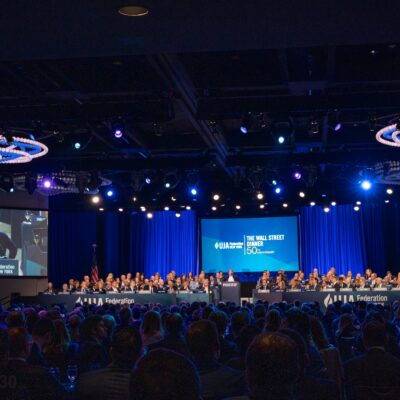Opinion
Mapping Jews and their Politics in the Age of Trump

By Steven Windmueller, Ph.D.
In the aftermath of this surprising and historic election, where can one find American Jews on the political spectrum? As with other constituencies, Jewish political behavior operates across a framework of party loyalties and ideological commitments.
A Trump Presidency will result in a fundamentally unique and transformative moment in this nation’s political culture. Not only are we likely to see strikingly different policy options and directions, but the cultural artifacts of politics, namely how this President will operate, will dramatically challenge existing norms of political behavior and action.
As we shift from a period of American liberalism to a time of political populism, deep fissures are dividing Americans in general and Jews in particular. Republican Jewish triumphalism is offset by the angst and uncertainty operating among many Jewish Democrats. In the aftermath of November, Jewish political differences may never have been more pronounced, as Jews debate what defines their vision for America and how they understand their self-interests in this new political reality.
Indeed, the political directions being chartered by the Trump administration will have particular implications for the State of Israel as Jewish Americans and Israelis consider the new dimensions of United States foreign policy in the Middle East and across the globe, just as the domestic agenda of this nation will be fundamentally reconfigured.
Celebration and Fallout:
The Trump victory has evoked an extraordinary set of responses. As noted elsewhere on this site, among Jewish members of the GOP, one finds a range of reactions, depending on their specific ideological and political space within the world of Republicanism. Indeed, there is excitement and anticipation on the part of the new President’s supporters, while a level of caution operates among other Republican Jewish players, still uncertain about all aspects of the policy directions being put forth by the Trump team. Within Democratic Jewish quarters one finds a heightened level of pessimism combined with a determined resolve to push back against an array of Trump initiatives that are seen in conflict with liberal social priorities. As progressive Jews begin to organize in order to challenge many of the initiatives scheduled to be introduced by the new administration, Jewish Republicans will defend many of the President-elect’s policies.
The Jewish Wars:
Conversations in both camps are centered on Donald Trump and the new American political environment. Synagogue and community groups entertaining programming around the 45th President are doing so either demonstrating extreme caution so as not to antagonize the existing political factions or dropping the façade of political neutrality, in order to embrace one side or the other. Emblematic of this nation’s political reality, these deep fault lines separating the political actors characterize the current state of the Jewish body politic. No one ought to be surprised then by the intensity of the political rhetoric and partisan battles that are unfolding.
Labeling and name-calling define the current political climate within our community. What constitutes “facts” and how “truth” is understood have themselves become issues in this tension-filled setting. When authoritative personalities offer thoughtful input, not only is their information dismissed but the credibility of the individual is brought into question. In this broader atmosphere of political ugliness, one finds a battleground of Jew vs. Jew where an array of personalities and policy issues are caught up in controversy.
Some Background Notes:
As a sidebar to this election, there has emerged a debate on the “whiteness” of American Jews. The statements of the Alt Right and some of their white supremacist fellow travelers prompted the publication this month of Emma Green’s piece in The Atlantic, “Are Jews White? Jews and the Social Construction of Race.” If the Alt-Right has concerns over the legitimacy of Jewish Americans as authentically “white,” then the controversies coming from the other end of the political spectrum, the left wing of the Democratic Party, should come as no surprise as Jews debate the candidacy of Congressman Keith Ellison for DNC chair.
This election has evoked other responses. There appears to be a growing pushback centered on American Jews as having “too much influence” within the political process. One can identify today references being made specifically about the overarching influence of the “Israel lobby” in shaping U.S. foreign policy outcomes. This assault on Jewish political influence can be found on both the political left and among some circles within the far right.
In the aftermath of this election, the presence of anti-Semitic rhetoric and threats as documented by the ADL and other groups continues to be of concern to different segments of the community.
Jewish Political Stakes:
In this age of political upheaval, five voting blocs define the Jewish political landscape:
Blue-State Jews: These traditional Democratic Party Jewish supporters would rally to Hillary Clinton’s campaign. Indeed, some 71% of American Jewish voters embraced the Clinton candidacy. They were particularly excited about the prospects of supporting the first woman President. Living with an unexpected defeat, many within this political cohort can be described as highly demoralized, yet becoming energized as they prepare to mobilize to defend their core interests and programs.
As the Democratic Party retools itself, one can expect a war over the control of the party’s future direction. This is borne out by the party’s left wing efforts to seek control over the direction and orientation of the Democratic Party, as demonstrated by the political fight over the DNC chair.
Millennial Jews: Many of these younger voters were aligned with Bernie Sanders at the outset of the 2016 campaign. Unhappy with their political choices in November, an estimated eight to ten percent of this class of younger voters decided to sit out the 2016 campaign.
In the aftermath of this election, it will be interesting to see if these folks remain active and under whose banner they will lend their support. This segment of the Jewish electorate may join with old-line Jewish leftists in possibly looking to candidates in the 2020 presidential sweepstakes that may reflect Senator Sanders’ agenda.
Neo-Conservative Voters: Many from within this constituency did not endorse or support Donald Trump. While disliking Hillary Clinton, these influential players were without a political home during much of the 2016 campaign. For many Neo-Conservative and mainstream Jewish Republicans there existed a level of discomfort with Mr. Trump’s flirtation with the Alt-Right and some of its anti-Semitic messages during the campaign. In addition, this political faction disagreed with a number of positions that candidate Trump put forth during the campaign, leaving them skeptical about his selection by mainstream Republicans.
Since his election there has been some movement to mend fences with the next President. Some of the tensions involving the Neo-Cons maybe put to rest, especially should Trump articulate positions that resonate to this wing of the Republican Party. On the other hand, various factions within the Republican conservative camp have expressed concern over several of the President-Elect’s proposed foreign policy appointments and his pro-Russian orientation.
Mainstream Jewish Republicans: While many may have reluctantly embraced the Trump candidacy, they have specific expectations for the new President, including his support for a strong Washington-Jerusalem relationship. Republican stalwarts will be carefully monitoring the political direction of their party with its array of ideological factions competing for Mr. Trump’s endorsement. The party’s base consisting of evangelical and social value Republicans, Tea Party members, and the traditional conservative wing will all be seeking to influence and shape the Trump Presidency. Add to this equation Donald Trump’s newly minted coalition of working class and rural white voters reflecting the new President’s anti-establishment credentials as an outsider committed to changing Washington politics.
Indeed, inside the Republican tent there are Jewish supporters (24% based on The New York Times Exit Poll) and funders who embraced Trump’s bid for the White House and now are generally enthusiastic with the policy and personnel choices that the President-elect has articulated. Other Jewish Republicans, who did not support Mr. Trump’s bid for the Presidency, have elected to take a “wait and see” approach to the President-elect’s cabinet selections and policy announcements. No doubt, as a political outsider, Donald Trump is seeking to re-define the GOP’s message and brand, bringing into the Party those new constituencies who supported his agenda while retaining the loyalty of the Republican base, including its influential Jewish members.
As is already apparent, the presence in the Trump Administration of a fairly significant number of Jewish appointees reflects the support for this President drawn from parts of the Orthodox community, Republican Jewish activists, and the business/financial sector.
Jewish Independents: This category of voters may be emerging as the fastest growing sector within the Jewish electorate, as Millennials, unhappy Republican Jewish activists and former Democratic Jewish stalwarts chart a different political course. Following a campaign with such high unfavorably ratings for each party’s respective presidential hopefuls, this class of voters will be shopping for political leaders that appeal to their mainstream policy instincts while demonstrating personal integrity, factors that led these voters to withdraw from the current state of party politics in favor of being highly selective when considering their future political choices.
The Policy Debates:
For different constituencies of American Jews, various policy issues will serve to define their connection to or disconnect from the Trump Administration. Four policy areas have specific importance to these various Jewish political blocs:
Managing the Washington–Jerusalem Relationship and Revisiting the Iranian Nuclear Accord Arrangements: Neo-Conservatives along with mainstream Jewish Republicans, as noted above, will be particularly interested in the President’s approach to foreign policy, and more directly the Middle East priorities of the United States. By undoing and altering the established policy positions of previous Republican and Democratic regimes, it would appear at this early moment in time that the Trump Administration is planning to manage its Israel relationships in a fundamentally different manner, creating new realities on the ground that will likely have a profound impact on the region, on Israelis and the Jewish community.
Supreme Court Nominee: For many liberal Jewish constituencies the Court’s judicial record on such issues as abortion, civil liberties, gun control legislation, immigration law, etc. will draw particular attention. As a result the President’s nominee to the Court will likely spark specific criticism. Similarly, the President’s social welfare policies will be of particular importance to this liberal voting bloc as they seek to preserve key social, economic and educational programs.
Environmental Issues and Cultural Affairs: For Millennial Jews and mainstream Jewish Democrats the policy issues centered on clean air, energy conservation, and water security will be of particular importance. Similarly, for many citizens how the Administration will define the broader contours of American culture will be significant and challenging as different groups and communities examine their place in a Trump America.
Economic Policies: Jewish conservatives will be carefully monitoring this area, incorporating tax and fiscal policies designed to enhance the business sector and to stimulate the economy.
A Final Assessment:
As the Trump Presidency unfolds, we are likely to see a range of political responses. Jewish Republicans will embrace segments of the President’s agenda. For Jewish Democrats their political response will involve a two-tiered approach: where they can find common ground with the new Administration, they will be supportive; yet in areas of disagreement, they will seek to articulate and mobilize their opposition to some of his appointments and various policy proposals.
In the aftermath of this campaign, the political lines have been drawn setting up a period of open warfare, pitting Jews against other Jews in a contest over influence and power. What may be lost in this mini-war for political dominance are the longer-term interests of the community in retaining its political credibility.
Dr. Steven Windmueller is the Rabbi Alfred Gottschalk Emeritus Professor of Jewish Communal Studies at the Jack H. Skirball Campus of the Hebrew Union College-Jewish Institute of Religion, Los Angeles. His writings can be found on the www.thewindreport.com.

 Add EJP on Google
Add EJP on Google









